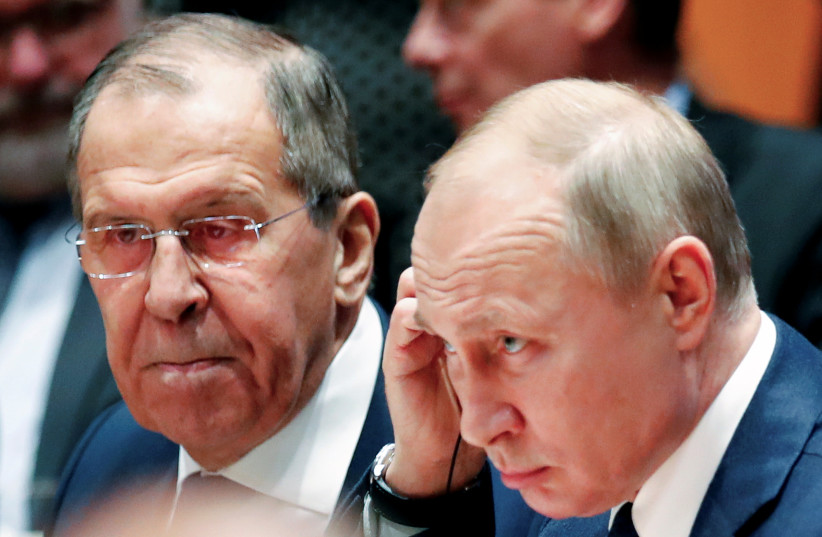In recent weeks, Russia and North Korea have both mentioned the use of nuclear weapons in future conflicts. Russia has mentioned nuclear weapons several times in the context of the Ukraine crisis, each time rolling out this talking point and then trying to pretend that it is behaving responsibly.
In the West, the pro-Russia voices and the excusers of Russia’s invasion have often put forward the concern that this could be “World War III.”
Iran, which is seeking nuclear weapons and often threatens to destroy Israel, is watching how Russia and North Korea can play the nuclear-threat card.
North Korean leader Kim Jong Un last week warned again that the North could preemptively use its nuclear weapons if threatened, and he praised his top army officials for a massive military parade in the capital, Pyongyang, AP reported.
“Kim expressed ‘firm will’ to continue developing his nuclear-armed military so that it could “preemptively and thoroughly contain and frustrate all dangerous attempts and threatening moves, including ever-escalating nuclear threats from hostile forces, if necessary,” the North’s official Korean Central News Agency said Saturday, the report said.

North Korea has been showcasing its arsenal, including intercontinental ballistic, according to media reports.
Meanwhile, TASS Russian News Agency recently tried to downplay the threat of nuclear war.
“Russia believes the risks of nuclear war should be kept to a minimum and that any armed conflict between nuclear powers should be prevented, the TASS news agency quoted a Foreign Ministry official as saying on Saturday,” Reuters reported. “Vladimir Yermakov, the Foreign Ministry’s head of nuclear nonproliferation, said all nuclear powers must stick to the logic laid out in official documents aimed at preventing nuclear war.”
In late April, Russian Foreign Minister Sergei Lavrov warned the West not to underestimate the risk of nuclear conflict over Ukraine. Russia is angry that the US and the West have jumped in to support Ukraine.
Prior to this war, Russia believed it could divide the West and destroy Ukraine easily. It was playing a bigger role in Asia, the Middle East and Africa. Now, Moscow is expending resources it didn’t want to and it is under sanctions.
THIS MEANS Russia is putting the nuclear-threat card on the table. It whispers about this card while pretending it doesn’t want to use it.
It’s important to note that this is the nuclear-threat card, not the threat of actually using nuclear weapons. The goal of Russia is to mention “nuclear” issues or use key terms like “existential threat” to get the West running in circles wondering what might happen.
In Western countries, surveys show there are fears of a larger conflict breaking out. Russia wants to play on the fears of war.
“The prospect of nuclear conflict, once unthinkable, is now back within the realm of possibility,” UN Secretary-General Antonio Guterres said March 14.
“Nearly 70% of Americans surveyed by the American Psychological Association said they ‘are worried the invasion of Ukraine is going to lead to nuclear war, and that they fear that we are at the beginning stages of World War III,’” CNBC reported in early April.
“The threat of a global nuclear war doesn’t feel as distant as it did a few weeks ago,” CBS reported last week. “A recent CBS News poll found that 70% of adults are worried Russia’s invasion of Ukraine could lead to fighting with nuclear weapons.”
Russia can read the report. So can North Korea and Iran. The goal of Iran is to always raise the threat of nuclear conflict to get concessions. Today, it is Iran enriching uranium and being close to “breakout.” But Iran might actually get closer to a nuclear weapon one day.
Back in 2012, some of the Iran regime excusers and later backers of the deal would argue that a nuclear Iran would bring stability. These are the kinds of voices who liked dealing with Russia during the Cold War because a nuclear-armed Russia could be appeased when it had nuclear weapons, and half the world surrendered to Russia’s sphere of influence.
The goal of the appeasers is often to give the nuclear-armed power a huge sphere of influence and not “threaten” or “provoke” it by supporting countries or people being suppressed by the nuclear power. In short, nuclear weapons are a form of privilege that allow countries to threaten others and suppress their neighbors.
Some have wanted Iran to have this privilege so that half the Middle East can be given to the Iran regime, and then any attempt to meddle in Iran’s entrenchment would be “escalation” and “provocation.”
In short, if Iran gets close to a nuclear weapon, it will need Iraq, Lebanon, Syria and Yemen, and maybe more areas, to control as its “near abroad,” because as a nuclear or nuclear-threshold state, it “needs” this huge area for “security,” and if it doesn’t have it, then this is an “existential” threat that forces Iran to have a “right” to defend itself and attack others.
The future Iran playbook is being written in Ukraine and also the Korean peninsula. Watching the language of Russia and North Korea is a peek into what Iran would like to do.
The question is whether Iran will get closer to nuclear weapons and thus engage the Iran lobby chorus in a new round of claims: “We need an Iran deal, or there could be war” – the same talking point used in 2015.
